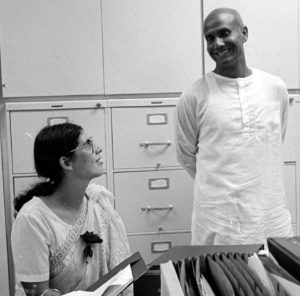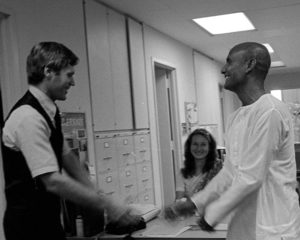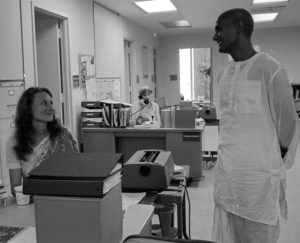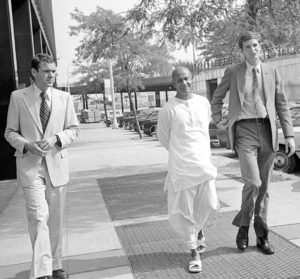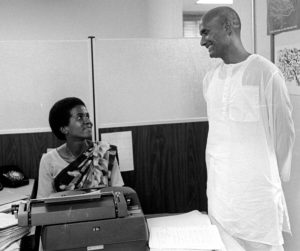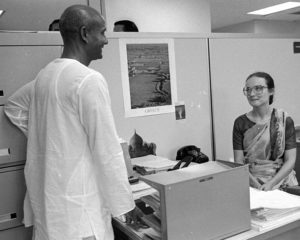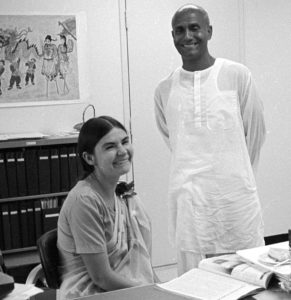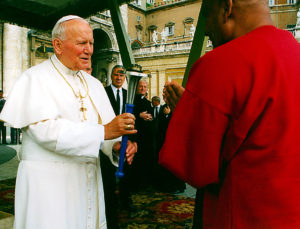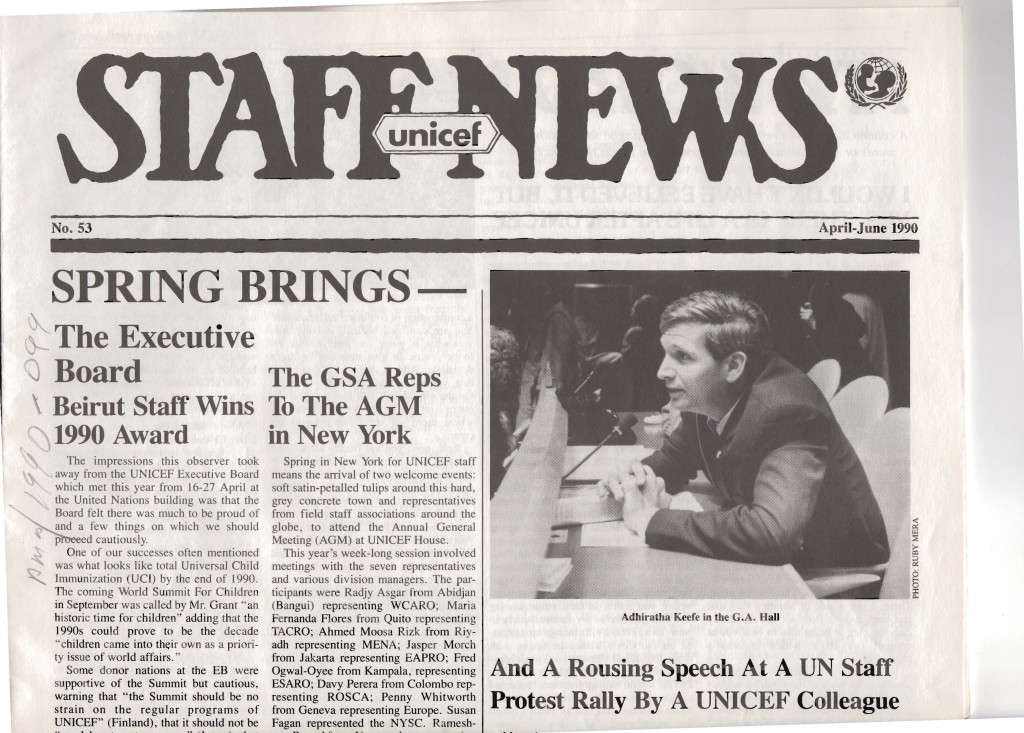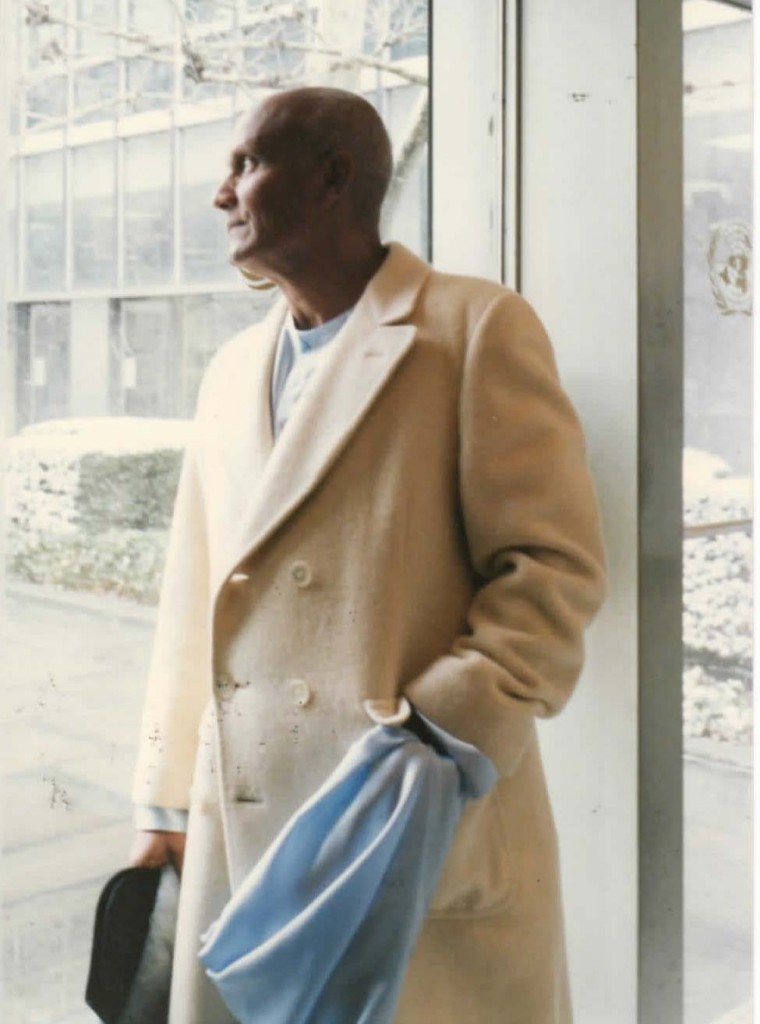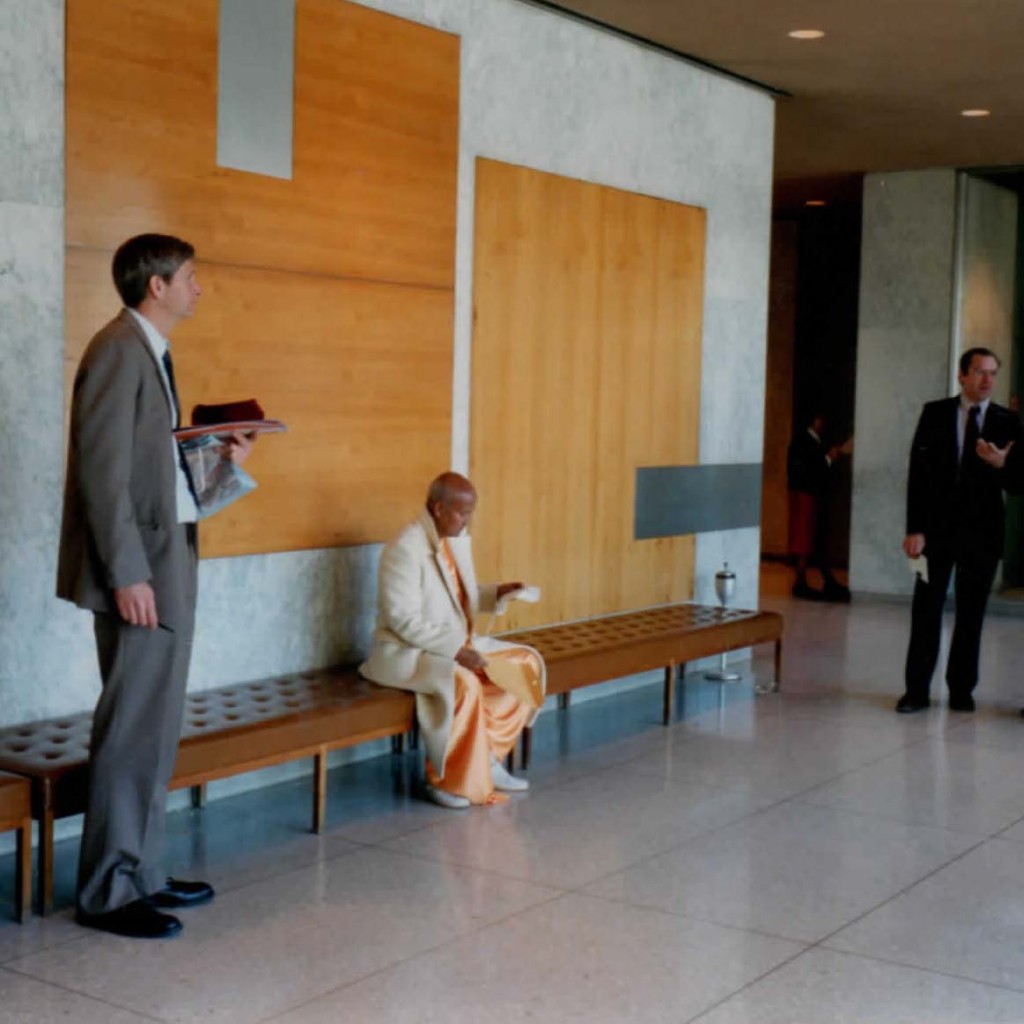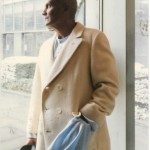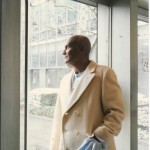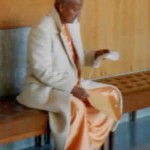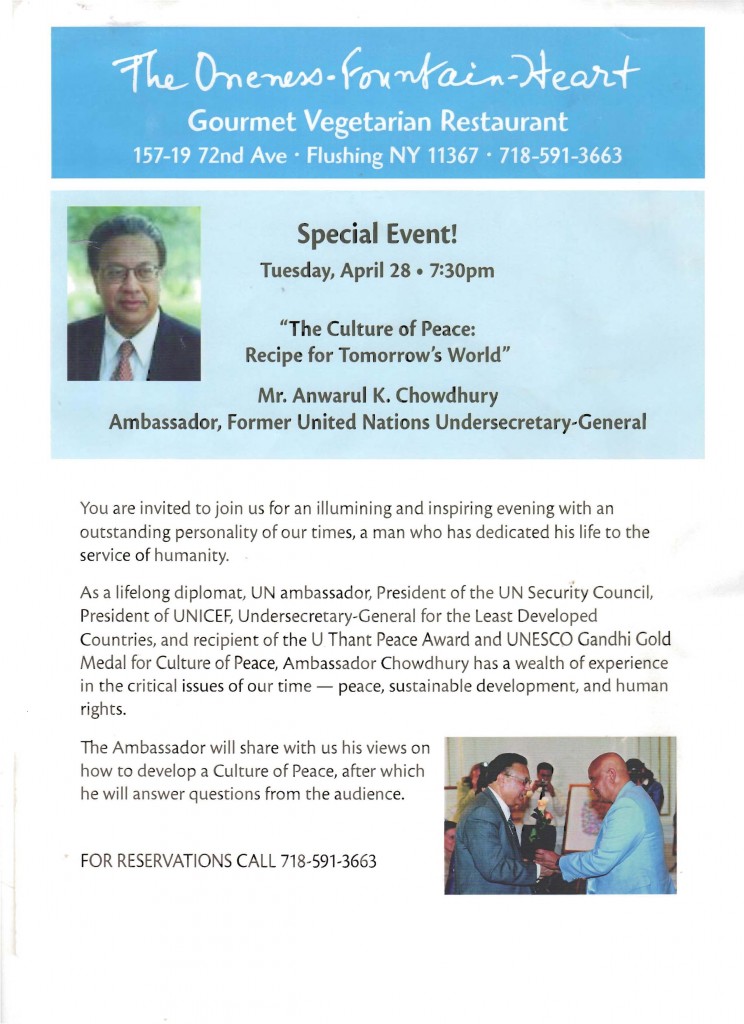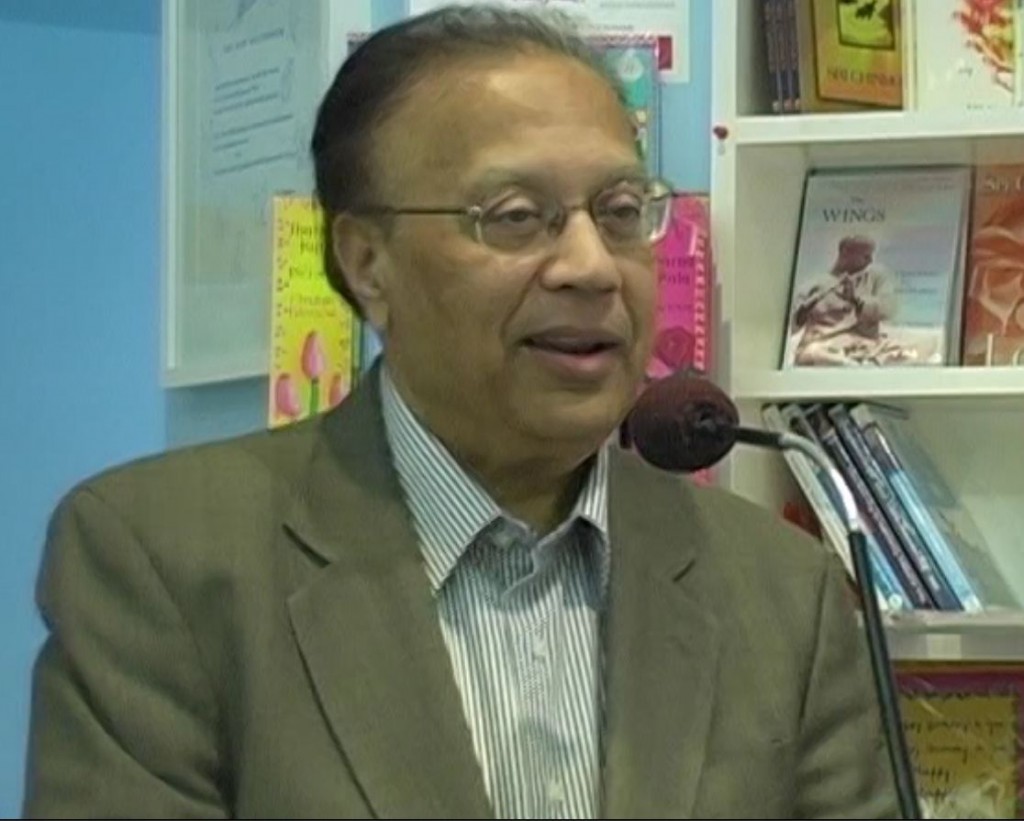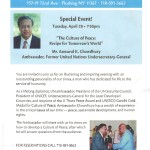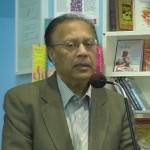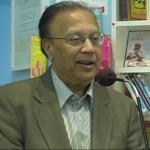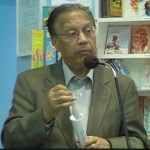Part 3-16 More Events Examples or Photo with Caption
Filed under Proj-Event-HighlightsThis is an additional list of events that seem to be good to have a short mention and if more information is available or an additional Photo with caption not mentioned in previous Sections.
This would be similar to what we did for the Lectures Part two… where we had some extra interesting quotes for m the talks that were not seleted fo the original 50 excerpts.
In future version if seems helpful can add more photos or text and place in one of the other updated sections
such as visit to UNICEF staff in work environment:
Sri Chinmoy walking upon leaving the UNICEF Headquarters Alcoa Building in 1980
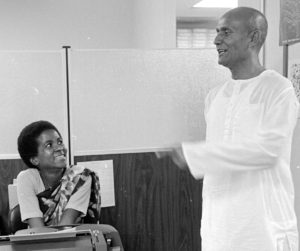
1980-09-22-01-sri-chinmoy-at-karabhi-Hart-unicef-work-area (this photo of Karabi is excellent for here of 3 -16
Sri Chinmoy visits with Karabi Hart in the UNICEF Supply Division
(Can fit somewhere else at end with blurb ) Not only focused at NY and Diplomatic commuity but expanded to include “those who served to further Peace, Cooperation and Harmony
Also in 1995
1995 Pope John Paul II received the torch from Peace Run founder Sri Chinmoy at the Vatican in Rome.
1995-Queen-Elizabeth-II-used-Peace-Run-Torch-to-light-first-of-1800-Beacons-of-Peace-across-Great-Britain-as-part-50th-VE-Day.
Her Majesty Queen Elizabeth II used the Peace Run Torch to light the first of 1800 Beacons of Peace across Great Britain as part of the 50th V.E. Day Celebrations.
(Can fit somewhere else at end with blurb ) Not only focused at NY and Diplomatic commuity but expanded to include “those who served to further Peace, Cooperation and Harmony
Also in 1995
1995 Pope John Paul II received the torch from Peace Run founder Sri Chinmoy at the Vatican in Rome.
1995-Queen-Elizabeth-II-used-Peace-Run-Torch-to-light-first-of-1800-Beacons-of-Peace-across-Great-Britain-as-part-50th-VE-Day.
Her Majesty Queen Elizabeth II used the Peace Run Torch to light the first of 1800 Beacons of Peace across Great Britain as part of the 50th V.E. Day Celebrations.
Meditation Group member statement in GA Hall includes “Bud is not a Flower” 1990 Mar 27
A member of the Sri Chinmoy: the Peace Meditation Group at the United Nations spoke in a meeting of UN, UNICEF and UNDP community held in the UN General Assembly Hall in March of 1990. During his remarks Adhiratha Keefe quoted a line ” A Bud is not a flower” .
This phrase is from the words of Sri Chinmoy for the Inaugural Meditation of the Group almost 20 years previously on 14 April 1970. Adhiratha’s talk was well received by those present in the 2,500 seat auditorium. Excerpts form media coverage is below with a link to download the complete speech.
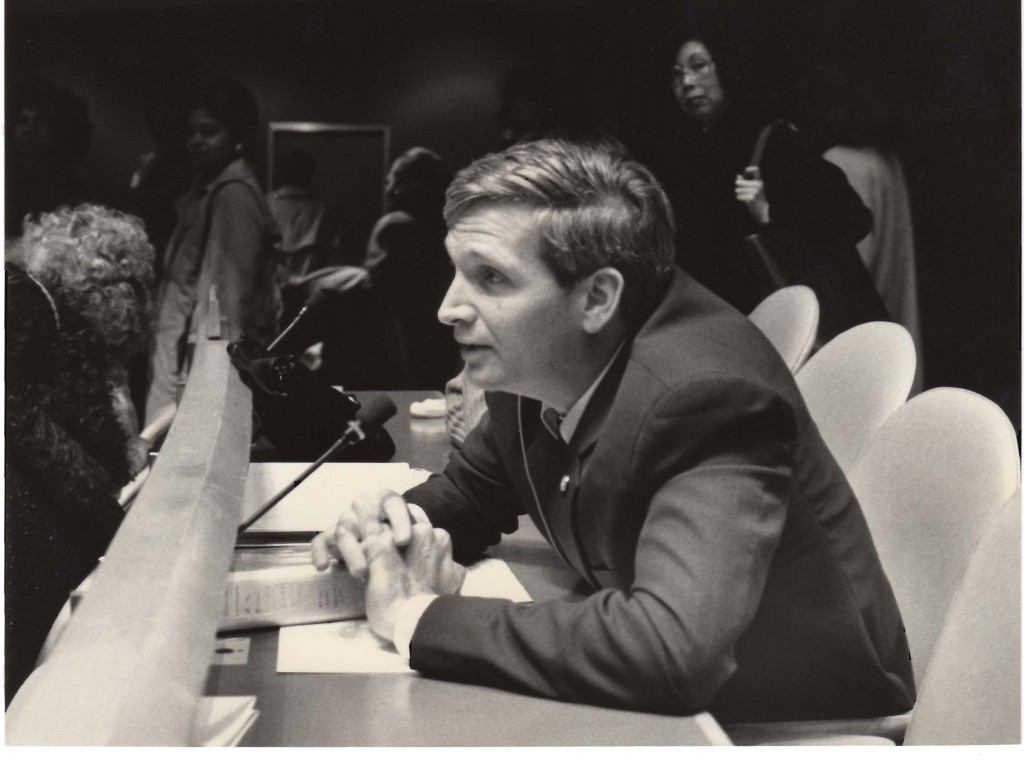 Adhiratha Keefe in the G.A. Hall
Adhiratha Keefe in the G.A. Hall
A Rousing Speech At A UN Staff Protest Rally By A UNICEF Colleague
More than 2500 UN and UNICEF staff members held several meetings and rallies outside the UN building and inside the General Assembly hall in late March to protest moves that would, in effect, cut their recent cost-of- living allowances.
In response to staff concerns, Secretary General Javier Perez de Cuellar promised in a meeting with the staff to review the proposed pay scale and called for a special meeting of the joint Appeals Committee. The Committee’s recommendations, which were due after 7 May, have still not been made public.
General service staff, who are the ones most affected by the pay cut, say they may lose almost all of a 4.6 per cent cost of- living allowance they received last November because the International Civil Service Commission are being paid more than people doing similar work in other organizations.
The staff say a job comparison conducted by the ICSC was flawed, partly because it failed to recognize that some UN posts required academic qualifications.
On 27 March, the Administration called a meeting to which UNICEF DOP Director Fuad Kronfol was invited along with Andrew Joseph of UNDP and Luiz Gomez and Kofi Annan of the UN.
At one of the staff rallies held in the G .A. Hall UNICEF staff member Adhiratha Keefe delivered a speech he had written during his lunch break to the audience, which filled the 2500-seat – auditorium. (Cont’d on p. 6)
As one UNICEF staff member wrote in a note to STAFF NEWS with the speech attached , .. Adhiratha got a standing ovation from the entire audience. He made all of us at UNICEF feel so proud!” Here’s Adhiratha’s speech:
Since we have the time now I felt I would share what I wrote during the lunch break. I raised my hand rather late in the discussion this morning because I felt I wanted to hear what others had to say especially the individuals who hold posts classified as general service. I held a few of those general service posts since I first started working here nearly seventeen years ago.
___________________________
Cartoon Inserted in Staff News Article
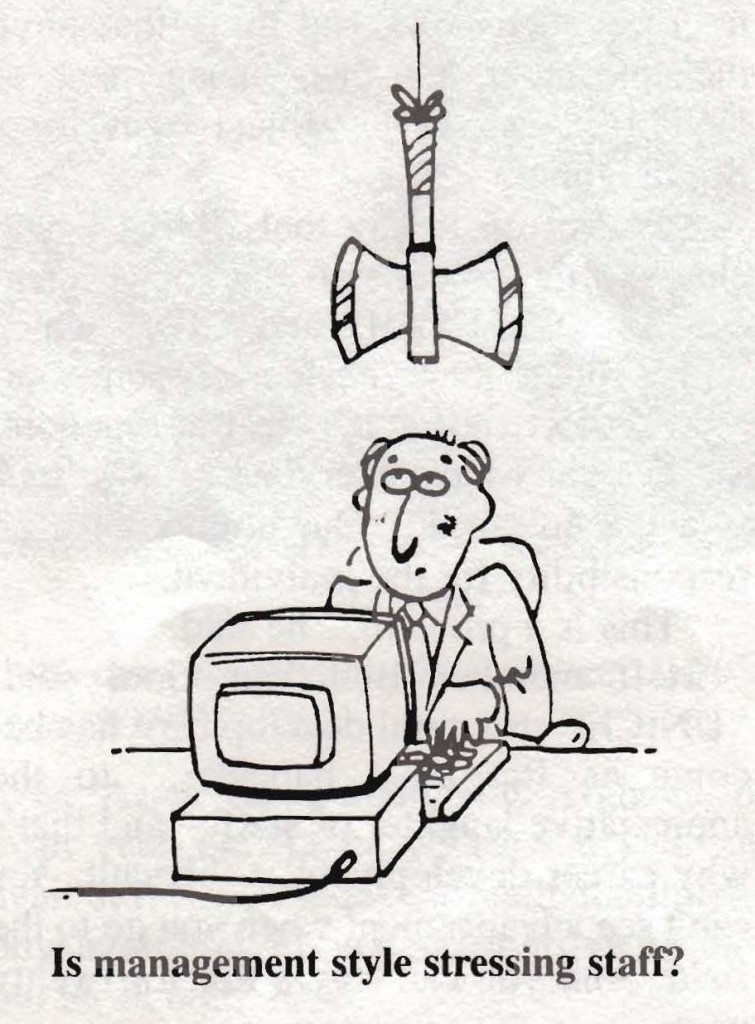 Is management style stressing staff?
Is management style stressing staff?
_____________________________
I am one of the small minority who have gone from G-2 to P-3 during that period. Some friends from my university days, who are outside the organization, might not think it so great to be at my level at my age after seventeen years – but that is not what I want to focus on.
_________________________
“The organization must not lose (its) idealists”
__________________________
As earlier speakers noted, many come here with great idealism, many leave and many lose their idealism. Some find their own ways to cope with disillusionment and some are lucky to have support groups and friends whose kind words-or more often their example-inspire us to continue.
But many deep down still believe in the reasons this organization was established. We stay because we want it to be a United Nations – a community of individuals from different cultures, nationalities and aspirations, but all joined together to bring about the vision set out in the charter. In our best times we are – as someone said earlier – simple people who have come here to serve this vision. But as someone has said: “a bud is not a flower” *. And a seedling will never become a tree unless it grows and matures. So many of us are supporting this action because we see it as an effort to make the Administration of the United Nations address a problem not only of this issue and the results that have come out of the recent survey and proposed salary scale, but of the process whereby many decisions are made.
It is symptomatic of a far deeper problem, and I think since our colleagues of the Press from the Correspondents’ Association were invited to attend this and many are here now, we should request them to use this opportunity to assist us in helping the wider audience to focus on the underlying issues.
It is not a simple matter of the GS staff wanting a raise (or not wanting a cut in salary) . I have seen a number of employee attitude surveys over the years and it is always pointed out that individuals’ first major concerns are not what they are paid-beyond a certain reasonable level. It is rather how they are treated and what real and perceived potential for growth they sense in the institution or organization they work for.
I perceive that the staff want the United Nations to set the example in all its activities – to be what it should be – and what many thought it was. Instead of justifying why it is not what it should be, the members of the administration should be coming up with concrete proposals and timetables for how the UN can become an organization where the development of its people is a main objective. If they believe that access to training opportunities is important- then this should become more of an issue with the Fifth Committee and other forums .
If there were a real career development plan – with substantive resources placed in meaningful training programmes for all levels of staff and not just for present duties, but for the duties one or two levels above where they are now, so they could be prepared to be considered for these posts when they become vacant – if this were the case, then we could think the administration was sincere in their recent arguments.
The organization must be ready for the changes in the world by attracting, training, retraining and retaining the best people it can, and not losing the idealists and those who speak out!
We must work to change this institution and, where necessary, ourselves, so that the organization and we-its people can be more worthy of the hopes and wishes of all those who believe in the dream for this house.
Let us begin here! Let us begin with the staff-for a real career civil service. Let us prepare for the future.
The world expects it of us. The dream must progress and become the reality. Thank you.
– From United Nations Children’s Fund (UNICEF) Staff News April – June 1990
* NOTE: “Bud is not a flower” From Sri Chinmoy’s talk at the United Nations: Inauguration Meditation April 14, 1970 “Today’s United Nations was yesterday’s perfecting Vision. Tomorrow’s United Nations is today’s fulfilling Realisation. Unity is not oneness. A bud is not a flower. Unity is the temple. Oneness is the shrine. The absence of unity is … Read more
After UN Peace Meditation Group Meeting in 1990s undated Photos posted as 1994-dec-31
After a meeting of the Peace Meditation at the United Nations there were images spontaneously taken by a meditation group member.
The location was the hallway between the Dag Hammarskjold Auditorium and main Secretariat Building and looking outside toward the toward the Traffic Circle and reflecting pool in front of the Main Secretariat entrance during the 1990′s?
dates to be confirmed.
Possibly waiting for the vehicle which would take Sri Chinmoy back to his Queens residence.
Posted here as for 31 Dec 1999 until a more accurate date can be confirmed:
Download PDF: 1994-12-dec-31-ckg-after-med-meeting-exit-looking-hall-door-CHECK-DATE
images possibly by v. Claxton?.
Click on images below for larger or different resolution photo – Images:
- 1994-12-dec-31-ckg-after-med-meeting-exit-looking-hall-door-CHECK-DATE_Page_03.jpg
Culture of Peace: Recipe for Tomorrow’s World – at Oneness Fountain Heart 2009 Apr 28
Filed under Other programmes | Thoughts from the UN community. | Edit
Special Event! Tuesday, April 28 • 7:30pm
iThe Culture of Peace: Recipe for Tomorrow’s World”
Mr. Anwarul K. Chowdhury Ambassador, Former United Nations Undersecretary-General You are invited to join us for an illumining and inspiring evening with an outstanding personality of our times, a man who has dedicated his life to the servi ce of humanity.
As a life long diplomat, UN ambassador, President of the UN Security CounciL President of UNICEF, Undersecretary-General for the Least Developed Countries, and recipient of the U Thant Peace Award and UNESCO Gandhi Gold Medal for Culture of Peace, Ambassador Chowdhury has a wealth of experience in the critical issues of our time – peace, sustainable development, and human rights.
The Ambassador will share with us his views on how to develop a Culture of Peace, after which he will answer questions from the audience.
Introduction by Adhiratha Keefe on behalf “Sri Chinmoy: The Peace Meditation at the United Nations.”
2009 April 28: Tues, 7:30 pm
Welcome to tonight’s programme: “The Culture of Peace: Recipe for Tomorrow’s World” here at The Oneness-Fountain-Heart in New York.
We are most fortunate to have with us His Excellency Ambassador Anwarul Chowdhury of Bangladesh, former United Nations Undersecretary-General for the most vulnerable countries. Ambassador Chowdhury has also held many other distinguished positions in the United Nations.
- He was his country’s Permanent Representative,
- President of the Security Council and
- President of the Executive Board for UNICEF.
- Ambassador Chowdhury has received many awards and honours, including the U Thant Peace Award and the UNESCO Gandhi Gold Medal for Culture of Peace.
I would like to thank The Oneness-Fountain-Heart and its proprietor, Aparajita Fishman, for hosting us today.
And our friend Michael Shashanka Karlin was instrumental in organizing tonight’s programme. Shashanka worked closely with former Undersecretary-General Vladimir Petrovsky in Switzerland for the Non-Governmental Organization called ‘Comprehensive Dialogue Among Civilizations’.
We see here a photograph of Sri Chinmoy, founder and leader of the Peace Meditation at the United Nations, who was a lifelong “lover and student of peace”. Sri Chinmoy referred to Ambassador and Mrs. Chowdhury as his dear Brother and Sister, and they enjoyed time together here at The Oneness-Fountain-Heart. We are delighted that Ambassador and Mrs. Chowdhury are joined tonight by their daughter and her husband, and we warmly welcome them all.
Sri Chinmoy said, “The outer message of the United Nations is peace. The inner message of the United Nations is love. The inmost message of the United Nations is oneness.”
He also affirmed, “From the United Nations we shall see the Oneness-World”. To be here tonight at The Oneness-Fountain-Heart and to hear about a Culture of Peace is truly a special opportunity.
Ambassador Chowdhury has been involved with the Culture of Peace and related issues – sustainable development and human rights – for many years. It was his tireless efforts as Ambassador of Bangladesh that led to the United Nations declaration of the year 2000 as the ‘International Year of Thanksgiving’ and the ‘International Year for the Culture of Peace’. This declaration in turn led to the ‘Special Decade for the Culture of Peace’. The General Assembly Resolutions provided a framework for many initiatives in support of the Culture of Peace around the world.
Ambassador Chowdhury has been an inspirer, an encourager and a facilitator to bring to fruition the highest ideals of the United Nations, not only within the United Nations itself, but around the globe. In the past decade he has relentlessly strived to bring the Culture of Peace to the attention of the public and of the highest decision-makers. He has traveled and lectured widely for this noble cause.
We are most grateful that he has come to share his vision and his inspiration with us tonight. Ambassador Chowdhury.
Text of Ambassador Chowdhury’s talk and questions and answers to be added. Video version available.t
- 2009-Apr-28-amb-chowdhury-recipe-oneness-fountain-heart-photo-snip-2
